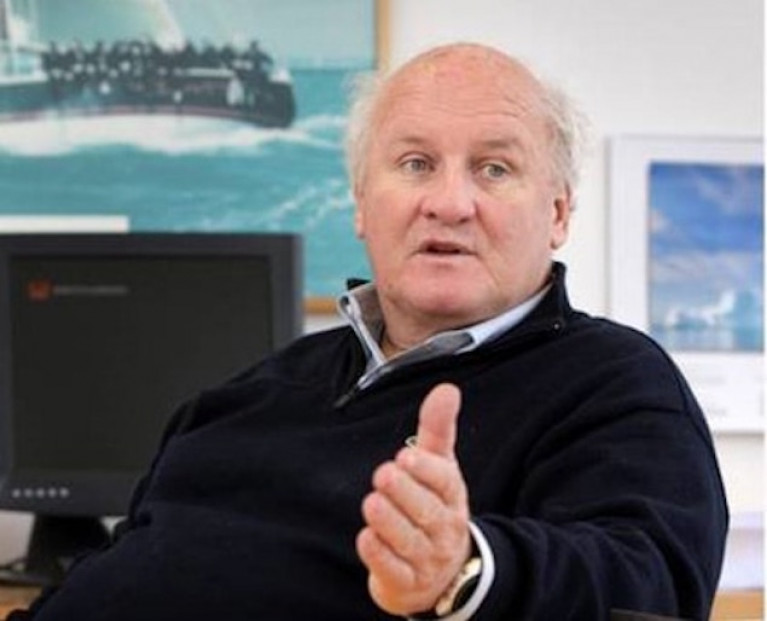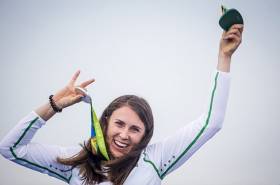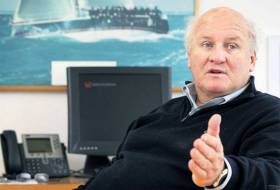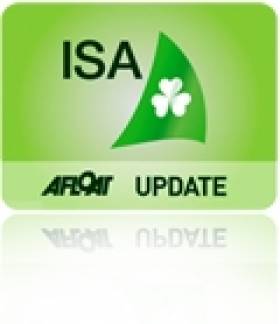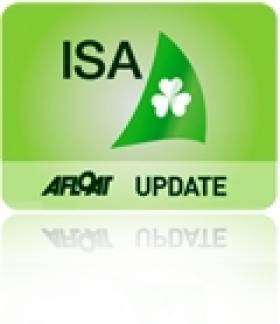Displaying items by tag: Irish Sailing Foundation
Irish Sailing Foundation's Colm Barrington Seeks Re-election as Olympic Federation of Ireland Vice President
The Irish Sailing Foundation Chairman Colm Barrington will stand for election as First Vice President of Olympic Federation of Ireland's Executive Committee, a position he has held since March 2017.
As regular Afloat readers will know, Barrington was instrumental in changing the OFI towards an athlete focussed organisation, introducing proper corporate governance and putting in place an appropriate professional management team.
The OFI Extraordinary General meeting will be held on 8 December 2020 and voting will open on the morning of the EGM at 11:30hrs (8 December 2020) and will close at 14:00hrs. The EGM will take place by zoom at 6 pm on 8 December 2020.
Founder and current Chair of the Irish Sailing Foundation, Barrington has raised significant philanthropic funding for high-performance sailing programmes that funded Irish Sailing’s High-performance Centre in Dun Laoghaire, Co Dublin.
Barrington was a competitive dinghy and keelboat sailor in Ireland, Continental Europe, UK and US for over 50 years.
See Barrington's full biographgy as listed by the OFI here.
Irish Sailing Foundation Honours Olympic Hero Annalise Murphy
#ISF - Rio silver medallist Annalise Murphy is now an honorary member of the Irish Sailing Foundation (ISF) following her incredible Olympic success this past summer.
The announcement comes as the ISF, the new investment support structure for Ireland’s high performance sailing programme, celebrates a year of achievement at every level of competition.
Indeed, Murphy’s medal win wasn’t the only result for Irish sailing in August, with fellow Team IRL members Ryan Seaton and Matt McGovern making their medal race in a final hurrah before their recent split, Andrea Brewster and Saskia Tidey just missing out on their skiff final, and Finn Lynch putting in a strong performance as the youngest in his class in preparation for a medal challenge at Tokyo 2020.
Beyond the Olympics, August was a good month for Johnny Durcan, Fionn Conway and Ronan Walsh, who took second, third and fourth places respectively in the UK Laser Nationals, while Johnny’s twin Harry Durcan, with Harry Whittaker, won the UK 29er Nationals in Torbay, and Tom Higgins sailed the first Irish boat to win the Volvo Gill Optimist National.
Earlier in the summer, there was success for Ireland’s girls in the Topper Worlds at Ballyholme, as Sophie Crosbie, Ella Hemeryck and Jenna McCarlie claimed the podium from gold to silver in that order, though the boys didn’t fare too badly either, with Michael Carroll in fourth and Jack Fahy sixth.
Elsewhere, at the Laser Worlds in Dublin, Nicole Hemeryck — sister of Ella — placed seventh in the U19 girls competition, while Ewan McMahon was second among the boys. Nicole was also second in the under 19s( 13th overall) at the under 21 worlds in Kiel, Germany.
And even earlier in the year, there was a bronze medal for Dougie Elmes and Colin O'Sullivan at the ISAF 420 Youth Worlds in Malaysia, the first ever podium for Ireland in that competition.
Currently all development teams in the Laser, Laser Radial and 49er have moved to Cadiz to escape the cold ahead of January’s annual World Cup in Miami, with further training camps to follow in Spain and Malta in February and March.
But the year isn’t over yet, as Ireland will be represented by Nicole Hemeryck and Johnny Durcan at the Youth Worlds in New Zealand from 14-20 December.
Looking at the longer term, ISA performance director James O’Callaghan will be on hand at a Performance Pathway information meeting at the Royal Cork this Wednesday 30 November where he will discuss, among other things, the results of his recent fact-finding mission to Tokyo.
O’Callaghan was gathering intel on the sailing venue at Enoshima with a view to Team IRL establishing an early base there — identified as one of the keys to Annalise’s medal finish this summer. That will be especially important at Tokyo 2020, where temperatures and humidity will be significantly higher than they were in Rio.
Irish Olympic Sailing Chief Colm Barrington On Rio, Funding & Ireland's 'Elusive' Sailing Medal
After Rio, Colm Barrington will step down as Chair of Sailing's Olympic Steering Group but remains in a fundraising role for the sport. Here, in answers to questions from Afloat.ie, he outlines his hopes for next month's Olympic Regatta, the future funding arrangements for Irish Olympic sailing and explains what an 'elusive' Olympic sailing medal might mean.
AFLOAT (A): In your tenure as Chair of the Olympic Steering Group, there have been some excellent performances in terms of high Performance sailing to the extent that we now tend to expect podium finishes at both youth and senior levels. Going to Rio, have these results helped with generating tangible support for the current Olympic campaigns?
COLM BARRINGTON (CB): Most importantly, the results achieved through the ISA Performance Pathway have resulted in greater competition for Olympic places and so have helped to up everyone’s game. This has been most evident in the Laser and Laser Radial classes where we had competition for places from and between Pathway sailors. As the Pathway sailors mature we hope that this trend will increase so that we have several young Irish sailors competing in the Olympic classes that are targeted.
As regards financial support, in every Olympic cycle interest peaks around the time of the Olympics. Sport Ireland has assessed our progress on a year by year basis and even though results have been really strong at Youth and Senior level it has not had an impact in terms of funding increases. However, this has to be viewed in terms of the overall level of government support for sport which has remained static over the last four years in the difficult economic circumstances. Relatively speaking sailing has done well in comparison with other sports. With the number of squads in our Pathway increasing it means there is no tangible increase in funding at an individual level even though more sailors are now benefitting from the programme.
(A) How do you see the role of the Irish Sailing Foundation in developing a sustainable and repeatable support structure?
(CB): The Irish Sailing Foundation was set up to support, develop and make sustainable a repeatable structure that is already in place with the ISA Performance Pathway. The Pathway is the project that James O’Callaghan and his team of coaches have implemented over the last ten years. The success of this programme is clear to see, in the last four years we have medalled three times at youth worlds. Sixty-six per cent of the RIO Olympic team are graduates from the Academy and another very pleasing statistic is that fifty percent of the team are female. It is now our job to make sure these talented youngsters progress. The goal of the Foundation is to widen the access to this Pathway, to help the progression along the pathway by providing the finance to allow sailors populate the structures regardless of their means and to achieve success at European, World and Olympic level. The motto of the Foundation is “From Pier to Podium”. I hope that the funds raised by the Foundation will give many more young people greater access to the Pathway and to High Performance sailing.
(A) Does the support extend to Paralympics?
(CB): The Foundation will consider disposition of funds to all High Performance sailing, including Paralympics. As you are aware, there is no Paralympic discipline in the 2020 Olympics and so the whole future development of High Performance Paralympic sailing is somewhat unclear right now.
(A) What would be the impact of a Rio medal – both in terms of a medal and in personal terms?
(CB): I believe that the impact on sailing in Ireland of an Olympic medal – or two – would be hugely positive. Ireland loves winners in sport and takes a huge interest in sports where we have winners. Take the public interest generated in women’s boxing after Katie Taylor began winning medals and in women’s rugby after we beat New Zealand. Ireland has not won a sailing medal at the Olympics since 1980 and despite the fact that our sailors have won World Championships, European Championships and World Cup medals in recent years, sailing is still very much below the public horizon. We have the potential to deliver a medal which would help attract a wider audience to what it is we do and why we are so passionate about it. The success Annalise Murphy had in London has already had an effect in the number of young girls with Olympic ambitions. A medal would bring sailing to the attention of a wider group, which would benefit our clubs, our sailing schools, our training programmes, the ISA and the sailing community in general. It would make all of us sailors feel great!
Personally I would be delighted if we could get that elusive medal. I would be particularly delighted for the athletes involved, for their families, for their trainers, for their mates in the training programmes and for all those who have supported them through the many hard years of training and competing, both financially and emotionally. This is my last chance as chair of the OSG as I will step down after twelve years shortly after the games end in Rio. I will remain as chair of the Foundation. If a medal in Rio could also help us achieve the goals of the Foundation then that would be an extra bonus.
Former Sailing President Calls For Sport to 'Regrow in a Balanced Way'
#sailing – A leading Cork sailing official who praises the reform of the Irish Sailing Association (ISA) has raised concerns over a new initiative to raise €2.7m for Irish Olympic and ISA pathway sailing. The comments follow a reader piece yesterday: Is Being an Olympic Sport Good for Irish Sailing?
Barry Rose, a former ISA President, says it is 'incredible' during a period of consultation by the ISA that the sailing community was not asked about the set–up of a 'new quango' called the 'Irish Sailing Foundation'. In a sport that is attempting to navigate its way out of recession, Rose warns If resources are 'sucked out of a limited pot' it will effect the ability of Clubs. The challenge, he says, is to 'regrow in a balanced way'.
Firstly I want to state that I fully support the high calibre current Olympic sailing campaigns that I believe have real chances to produce sailing medals that will lift our sport at the next Rio Olympics. Annalise's fantastic performance at the last Olympics richly deserved a medal and lifted all our enthusiasm for the sport. Watching the medal race in Newenhams in Schull was like watching a Six Nations final. It was great.
The current reform and re–connect with the grassroots of sailing taking place in ISA is admirable and needs to happen. Well done to the team driving this through. It seems incredible to me that in the middle of this process without consultation with the wider sport and seemingly out of the blue an advertisement would appear for a CEO of what appears to be a new quango called ISF (apparently under the auspices of the ISA) whose brief is to raise €2.7m a year from a tight economy for elite and Olympic sailing in addition to funds currently generated.
Where has this come from? If this amount of resources is sucked out of a limited pot will it effect the ability of the grassroots to raise funds for Clubs and the events that form the backbone of the sport on the ground in the form of sponsorship and funding vital support structures to grow the wider sport.
We live in interesting times for our sport. There are green shoots everywhere. Enthusiastic sailors and volunteers on the ground are driving the sport in positive directions. Classes like the National 18s are re inventing themselves with a new boat and double figures ordered in its first year, the well organised RS classes are attracting great sailors back in to dinghy sailing in two man dinghies and are having a blast in cool competitive boats at reasonable cost for all age groups. The dynamic of each Class sailing together Fevas, 200s and 400s has really worked with a fun friendly inter reaction at events. Clubs are developing fleets of 1720s and dinghies to offer opportunities to get on the water without owning a boat and grow the sport.
On the Cruiser Racing front ICRA are promoting the sector enthusiastically despite the economic environment and initiating crew training programmes (with ISA support) and growing ever stronger National Championships. Strong Irish teams have won two Commodore's Cups since 2010 exposing many young and some not so young Irish sailors to the highest level of Competition in this field in what is effectively the World Championship of IRC racing. This has happened with incredible commitment by dedicated owners, sailors and a voluntary support team effort by ICRA who are endeavouring to raise some funding support for these types of Irish International challenges.These teams have brought huge credit to Irish sailing displaying a clinical winning approach to every detail on and off the water in significant International events.
We need at this time to plot a careful course for all our sport to regrow in a balanced way that supports the great enthusiasm and innovation that is driving bringing the fun back in to sailing from the ground up in all aspects of the sport.
The Glass is definitely half full not half empty, let's not knock it over! That's the challenge!
Well done for raising the question! It's healthy to debate and reflect!
Irish Sailing Association Aims to Raise €2.75m Annually for Olympic Team
#irishsailingfoundation – A new Irish Sailing Association (ISA) organisation called the 'Irish Sailing Foundation (ISF)' expects to build 'philanthropic fund raised income to €2.75 million annually in support of the high performance mission and programmes'. The new organisation is seeking to recruit a Chief Executive that is 'an exceptional leader with a track record of building income' to change the funding of high performance sailing in Ireland.
The Irish Sailing Association recently published its new strategic plan and it is currently meeting sailing clubs from around the country to outline details of the plan.
After a period of controversy over association policies, the new plan outlines a vision for sailing until 2020 and confirms sailing as the third best supported sport by Irish Sports Council.
A main change proposed for the ISA in the plan is an 'emphasis on upgrading the support structures for sailors not involved in the ISA High Performance'.
The plan refers to the development of 'professional fund-raising' for its high performance team but it does not refer specifically to the set up of a new organisation nor does it refer to the 'Irish Sailing Foundation'.
As Afloat reported previously, the recruitment advertisement for the ISF's new CEO was advertised in last Friday's Irish Times and across Sunday national newspapers too. It is also posted on the association's website.
The high performance objective is to secure top 8 results for Irish sailors in the Olympic Classes at Worlds, Europeans and Olympics. To do this it focuses on identifying, supporting and coaching sailors who can succeed in Olympic competition. The advert says 'securing of significant philanthropic support and augmenting the funding provided by the Irish Sports Council will improve performance at Olympic level, increase the level of competition for those on squads and widen access and participation'.
More details and a copy of the advert for download is available here.
Irish Sailing Association Seeks CEO For New 'Irish Sailing Foundation'
#irishsailingfoundation – The Irish Sailing Association (ISA) is seeking a Chief Executive Officer for a new 'Irish Sailing Foundation' (ISF) to raise €2.75m annually in 'philantropic' sailing funding to 'improve performance at Olympic level, increase the level of competition for those on squads and widen access and participation'.
The announcement comes in the form of an advertisement for a CEO for the ISF in today's Irish Times newspaper. (download a copy of the advert below as a jpeg file).
Last month, the Irish Sailing Association (ISA) launched a strategic plan to 2020 with a mission to develop the sport 'in union' with clubs, training centres and associated organisations.
Today's advertisement says the successful candidate will be 'an exceptional leader with a track record of building income to this level in either the private or not–for–profit sector'. No salary details are supplied.
The closing date for applications is February 27th.
Further similar adverts appeared in The Sunday Times and Sunday Business Post of February 1


























